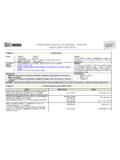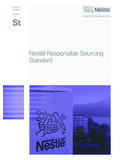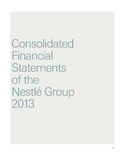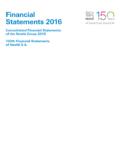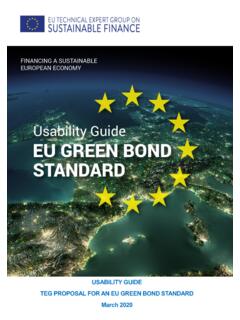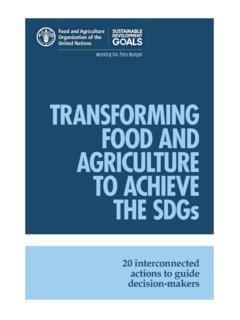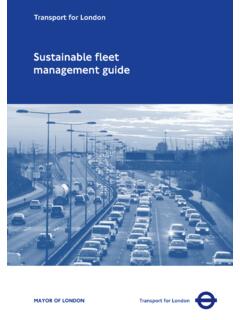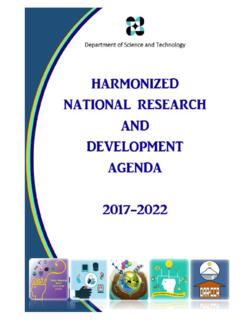Transcription of The Nestlé Policy on Environmental Sustainability
1 PolicyMandatoryFebruary 2013 The Nestl Policy onEnvironmental SustainabilityPolicyMandatoryFebruary 2013 Issuing departmentSafety, Health and Environmental SustainabilityTarget audience Public, all employeesApproverExecutive Board of Nestl Nestl Principles and Policies, Standards and Guidelines can be found in the Centre online repository at: Policy is also registered as rights belong to Nestec Ltd., Vevey, Switzerland. 2013, Nestec Policy is complemented with more detailed commitments on specific Environmental issues available at Ltd., Corporate Identity & Design, Vevey, SwitzerlandProductionbrain print GmbH, SwitzerlandPaperThis report is printed on BVS, a paper produced from well-managed forests and other controlled sources certified by the Forest Stewardship Council (FSC).1 The Nestl Policy on Environmental SustainabilityAt Nestl , the recognised world s leading Nutrition, Health and Wellness company, we believe that to be successful over the long-term we need to create value for our shareholders and for society as a whole.
2 We call this Creating Shared Value (CSV). As an essential prerequisite for CSV we not only have to comply with all applicable legal requirements and The Nestl Corporate Business Principles but also ensure that the principle of sustainable development is embedded in our activities, brands and means protecting the future by making the right choices in an environment where water is increasingly scarce, natural resources are constrained and biodiversity is declining. All of these elements are vital for feeding a growing world population and for the development of Nestl . Moreover, climate change may exacerbate our Planet s Environmental challenges. Nestl is therefore committed to: full compliance with all applicable legal Environmental requirements and our internal requirements where specific Environmental legislation is non-existent or insufficient; the continual improvement of the Environmental performance of our activities, products and services and prevention of pollution through the Nestl Environmental Management System (NEMS) which complies with the international ISO 14001 standard; the systematic assessment and optimisation of Environmental impacts in the design of new and renovated products; the responsible sourcing of ingredients, packaging materials and other goods and services from suppliers who comply with the Nestl Supplier Code and demonstrate continual improvement of their Environmental performance;so that Nestl s products will be not only tastier and healthier but also better for the environment along their value chain.
3 Commitment of the CEO to environmentally sustainable business practicesThis also means delighting consumers by giving them another reason to trust Nestl and enjoy our products, and living up to employees and external stakeholders expectations about our Environmental responsibility and practices. Nestl is therefore committed to: meaningful and accurate Environmental information and dialogue based on scientific evidence about our products, activities and services at corporate, market and product brand level; independent Environmental auditing, verification and certification of our practices and along our supply chain; Environmental awareness training and education for our employees, alongside effective communication with employees and recognition of their initiatives and achievements towards Environmental improvement; proactive long-term engagement and partnerships with stakeholders, including regulators, scientists, customers, business partners, civil society organisations and the community, in order to define, implement and evaluate solutions to the complex Environmental challenges we are the Chief Executive Officer of Nestl , I am determined to provide the leadership and resources to make sure that this commitment is fully integrated throughout the Company.
4 Paul Bulcke Chief Executive OfficerSustainabilityComplianceCreating Shared ValueNutrition, water, rural developmentLaws, business principles, codes of conductProtect the future2 The Nestl Policy on Environmental SustainabilityWe apply a product life cycle approach involving our partners from farm to consumer and beyond. Specific to our food and beverage business we focus on water preservation, natural resources efficiency, biodiversity conservation, air emissions reduction, climate change adaptation, and zero Research and DevelopmentNestl Research and Development centres have two primary objectives: to create new products and processes and to improve those that already exist. In order to have Environmental Sustainability being more and more built into products, our Sustainability by Design Programme systematically assesses and optimises the Environmental performance across the entire value chain at the earliest stage in the development of new and renovated products.
5 Our global Sustainability by Design Network champions the continuous improvement of this programme across the different businesses and categories. 2. Sourcing of Raw MaterialsNestl sources its raw materials either directly from farmers or from primary processors or traders. We prefer to use agricultural materials which are locally available. We foster Environmental Sustainability in the supply chain through: the Responsible Sourcing Audit Programme which requests key vendors to demonstrate compliance with Nestl s Environmental standards through independent third party audits; if corrective actions are required Nestl , together with auditors, will guide vendors in upgrading their practices; the Responsible Sourcing Traceability Programme which promotes transparency in our extended supply chains back to the farm or feedstock, implementing our commitments on no-deforestation, responsible use of water, sustainable fisheries and animal welfare, and addressing other specific Environmental aspects; the Farmer Connect Programme which supports the farming communities where we source agricultural raw materials, and provides technical assistance on sustainable production methods; we also optimise the delivery of raw materials up to the factory.
6 The sustainable Agriculture Initiative at Nestl which shares best practices and lessons ManufacturingManufacturing comprises all processes that are necessary to transform perishable raw materials into safe and value-added food products for consumers. Building on the ISO 14001 certification of our factories, we aim to do more with less by eliminating all types of waste, with a key focus on what is valuable for both the environment and our consumers. We thus improve our overall efficiency, quality and Environmental performance. We aim to use the most efficient technologies and apply best practices in order to further optimise energy and water consumption, minimise waste generation, utilise sustainably-managed renewable energy sources, recover value from by-products and control and eliminate emissions, including greenhouse use safe natural refrigerant alternatives for industrial refrigeration installations and implement new solutions to improve their incorporate Environmental Sustainability objectives when we build, construct and renovate facilities.
7 4. Packaging The packaging of our products is crucial to prevent food waste, guarantee our high quality standards and inform our consumers. We: optimise the weight and volume of our packaging; lead the development and use of materials from sustainably-managed renewable resources considering packaging and product performance requirements; support initiatives to recycle or recover energy from used packaging; use recycled materials where there is an Environmental benefit and it is appropriate. Meeting our commitment3 The Nestl Policy on Environmental Sustainability5. Distribution Delivering the products in highest quality and on time from the factory to customer is a vital part of our business. To continuously enhance efficiency and Environmental performance in distribution, we: optimise distribution networks and route planning across all our operations; explore opportunities to improve transportation, use sea and rail instead of road; expand driver training both from a safety and Environmental efficiency perspective, use telematics and latest technology on our vehicles where practical, and recommend the same to our suppliers; support the development and use of safe and efficient natural refrigerant solutions for commercial applications and progressively phase out HFCs Marketing & Consumer Communication Marketing s most fundamental commitment is to delight consumers every day, everywhere, thereby building trust.
8 As part of building trust, we: integrate Environmental Sustainability into our products, and brand communication where applicable; help consumers make informed choices through credible, substantiated communication; leverage relevant contact points ( digital, packaging and point-of-sale) to inform consumers of Environmental improvements, as well as action they can take when using our products and handling used packaging; support and shape the development of Environmental communication best practices and standards, working in collaboration with industry, government and public forums. 7. Corporate CommunicationCommunication on the topic of Environmental Sustainability is an increasingly important part of our corporate communication strategy involving media relations and engagement with non-governmental organisations, special interest groups, governments and public authorities. Our Nestl in Society website features our activities on Environmental Sustainability and water.
9 A strategic priority for us is to engage stakeholders and develop key partnerships. Our proactive engagement with stakeholders on Environmental topics includes regular external stakeholder convenings and meetings. We also seek to nurture constructive relations with organisations critical of the Company s Environmental Human ResourcesWe educate all employees to live by the Nestl corporate business principle on Environmental Sustainability We make Nestl resourceful and therefore, we: train all employees on this Policy ; create conducive workplace conditions that help all employees take personal responsibility for protecting the environment by promoting application of this Policy to day-to-day activities at the workplace as well as at home; ensure Environmental Sustainability is covered as part of relevant training, workshops and meetings to raise commitment of our employees, suppliers, business partners and the community at large.
10 Promote corporate and personal responsible behaviour towards the environment through publishing success stories and recognising positive initiatives to embed these practices within Nestl and the local community. 9. RegulationWe carefully monitor, evaluate and communicate regulatory developments so that they are reflected in our strategies. To promote an effective regulatory system with respect to Environmental Sustainability , we: engage with regulators and other relevant stakeholders to foster environmentally efficient and effective laws and regulations; support internationally recognised standards and voluntary initiatives designed to protect the environment; oppose discriminatory measures; favour the harmonisation of Environmental laws, regulations and standards in order to develop trade and help consumers Nestl Policy on Environmental SustainabilityThe Board of Directors (BoD) is the ultimate governing body of the Company.


